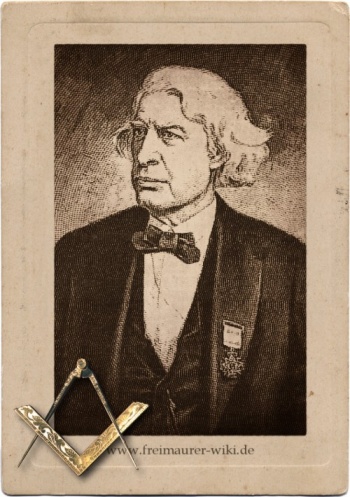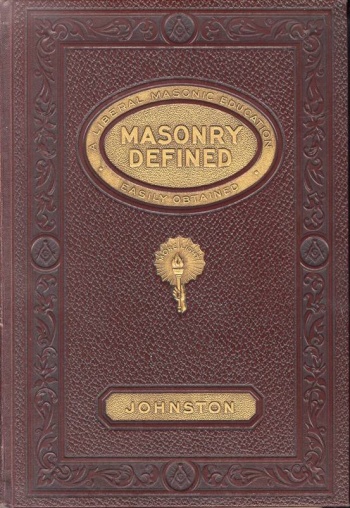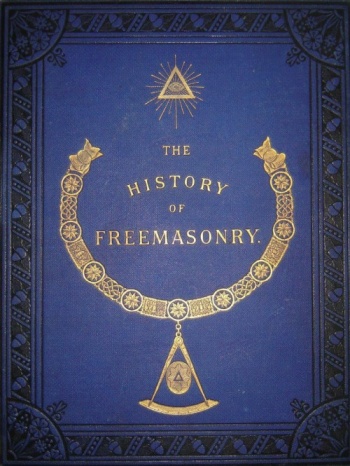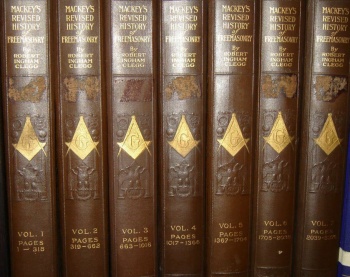En:Albert Mackey
Bitte auch für die deutsche Ausgabe übersetzen (Anm. d. Red.)
Albert Mackey
Source: Mackey's Encyclopedia of Freemasonry
The American Masonic historian. He was born at Charleston, South Carolina, March 12, 1807. This scholarly Brother lived to the age of seventy-four years. He died at Fortress Monroe, Virginia, June 20, 1881, and was buried at Washington, District of Columbia, Sunday, June 26, with all the solemnity of the Masonic Rites wherein he had long been an active leader. From 1834, when he was graduated with honors at the Charleston Medical College, until 1854 he gave attention to the practice of his profession, but from that time on literary and Masonic labors engrossed his efforts. Doctor Mackey was a Union adherent during the Civil War and in July, 1865, President Johnson appointed him Collector of the Port. In a contest for senatorial honors Brother Mackey was defeated by Senator Sawyer. Doctor Mackey removed to Washington. District of Columbia, in l870.
Doctor Mackey was Initiated, Passed and Raised in Saint Andrews Lodge No. 10, Charleston, South Carolina, in 1841. Shortly thereafter he affiliated with Solomon's Lodge No. 1, also of Charleston, and was elected Worshipful Master in December, 1842. From 1842 until 1867 he held the office of Grand Secretary and during this period prepared all the reports of the Foreign Correspondence Committee of the Grand Lodge. In 1851 he was a founder member of Landmark Lodge No. 76. During the winter of 1841-2 he was advanced and exalted in Capitular Freemasonry; elected High Priest in December, 1844; and also elected Deputy Grand High Priest in 1848 and successively re-selected until 1855. From 1855 to 1867 he was each year elected as Grand High Priest of his State. Elected in 1859 to the office of General Grand High Priest, he continued in that position until 1868. Created a Knight Templar in South Carolina Commandery No. 1, in 1842, he was elected Eminent Commander in 1844, later being honored as a Past Grand Warden of the Grand Encampment of the United States. Crowned a Sovereign Grand Inspector General of the Thirty-third and last Degree in 1844, he was for many years Secretary-General of the Supreme Council, Southern Jurisdiction of the Ancient and Accepted Scottish Rite.
As a contributor to the literature and science of Freemasonry, Doctor Mackey's labors have been more extensive than those of any other in America or in Europe. In 1845 he published his first Masonic work, entitled A Lexicon of Freemasonry; in 1851 he published his second work entitled Tame True Mystic Tie. Then followed The A11iman Rezon of South Carolina, 1852; Principles of Masonic Law, 1856; Book of tile Chapter, 1858; Text-Book of Masonic Jurisprudence; 1859; History of freemasonry in South Carolina, 1861, Manual of the Lodge, 1869; Cryptic Masonry, 1877; Symbolism of Freemasonry, and Masonic Ritual, 1869; Encyclopedia of Freemasonry, 1874; and Masonic Parliamentary Law, 1875. Doctor Mackey also contributed freely to Masonic periodicals and edited several of them with conspicuous ability. In 1849 he established and edited the Southern and Western Masonic Miscellany for five years. In 1857 he undertook the publication of the Masonic Quarterly Review which continued for two years. Then he was invited to assume editorial charge of a department in the American Freemason which he accepted in July, 1859, and he held this position for one year. He was solicited to take charge of a department in the Masonic Trowel, his first article appearing in the September number of 1865, and he wrote for this publication for nearly three years. In October, 1871, Doctor Mackey again published a Masonic magazine of his own, Mackey's National Freemason. Although a periodical of great merit, after three years it was discontinued. In January, 1875, Doctor Mackey became one of the editors of the Voice of Masonry, and for over four years was a constant contributor to that periodical, when failing health necessitated his giving up this work.
After Doctor Mackey located at Washington, District of Columbia, he affiliated with Lafayette Lodge No. 19, Lafayette Chapter No. 5, and Washington Commandery No. 1.
The funeral services in Washington in 1881 were begun at All Souls Church, Unitarian, of which Doctor Mackey was a member, by the pastor and were followed by the ceremonies of a Lodge of Sorrow, Rose Croix Chapter, Ancient and Accepted Scottish Rite, Southern Jurisdiction, and were in charge of the venerable General Albert Pike and his associate officers. General Albert Pike wrote a touching and appreciative message at the time of the death of Doctor Mackey, which was sent out officially by the Sovereign Grand Commander of the Southern Jurisdiction in which the various Masonic Bodies were instructed to "drape in black the altars and working tools and the Brethren will wear the proper badge of mourning during the space of sixty days."
"Albert Gallatin Mackey" by R. I. Clegg
Source: The Builder - December 1922
By Bro. Robert I. Clegg. Ohio
Born at Charleston, South Carolina, on March 12, 1807, this scholarly brother lived to the age of 74 years, dying at the Hygeia Hotel at Fortress Monroe, Virginia, June 21, 1881. He was buried by his bereaved family and sorrowing brethren at Washington, D.C., on Sunday, June 26, with all the solemnity of the several ceremonies of the Masonic Rites wherein he had so long been active in leadership.
Graduating with honours at the Charleston Medical College in 1834, Dr. Mackey entered immediately the busy practice of his profession which chiefly occupied his time until 1854 when his literary and Masonic labours engrossed his efforts. During the Civil War Dr. Mackey was a Union adherent, and President Johnson appointed him Collector of the Port. Some active interest was taken by him in polities and in a contest for senatorial honours he was defeated by Senator Sawyer in the canvass. Following this experience Dr. Mackey removed to Washington, D. C., in 1870.
In St. Andrews lodge, No. 10, at Charleston, South Carolina, in 1841, Dr. Mackey was initiated, passed and raised. Soon thereafter he affiliated with Solomon's Lodge No. 1, of the same city, becoming Worshipful Master in December, 1842. He became Grand Secretary that year and held this office until 1867, for many years preparing the reports of the Foreign Correspondence Committee of the Grand Lodge. He was one of the founder members in the formation of Landmark Lodge, No. 76, in the year 1851.
Advanced and exalted in Capitular Freemasonry during the winter of 1841-1842, he was elected High Priest in December, 1844; was also elected Deputy Grand High Priest in 1848 and successively re-elected in that position until 1855. In this year and every year thereafter to 1867 he was elected as Grand High Priest of his State. Elected General Grand High Priest in 1859, he continued in that office until 1868.
Dubbed and created a Knight Templar in South Carolina Commandery No. 1, in 1842, he was elected Eminent Commander in 1844, later being honoured as a Past Grand Warden of the Grand Encampment of the United States.
Crowned a Sovereign Grand Inspector General of the Thirty-third and last Degree in 1844, he was for many years Secretary-General of the Supreme Council, Southern Masonic Jurisdiction of the Ancient and Accepted Scottish Rite.
Editorially he conducted for many years the Southern and Western Masonic Miscellany. For two years he was editor-in-chief of the Masonic Quarterly Review. In 1859 Dr. Mackey became editor of the Department of Masonic Miscellany in the American Freemason, and for three years, beginning in 1872, he published Mackey's National Freemason.
Becoming a contributor to the Voice of Masonry in 1875, Dr. Mackey continued actively his writings in that publication until 1878 when his failing health completely checked his further labourist for that periodical.
Prolific as an author his books included the History of Freemasonry in seven volumes, the Encyclopedia of Freemasonry in two volumes, Symbolism of Freemasonry, Masonic Jurisprudence, Manual of the Lodge, Book of the Chapter, Principles of Masonic Law, Lexicon of Freemasonry and the Mystic Tie.
After Dr. Mackey, located at Washington D.C., he affiliated with Lafayette Lodge, No. 19, Lafayette Chapter, No. 5, and Washington Commandery, No. 1.
The funeral services in Washington on Sunday, June 26, 1881, were begun at All Souls Church, Unitarian, of which Dr. Mackey was a member, and were conducted by the pastor. Then followed the ceremonies of a Lodge of Sorrow, Rose Croix Chapter, Ancient and Accepted Scottish Rite, Southern Masonic Jurisdiction, and were in charge of the venerable General Albert Pike and his associate officers.
The long white flowing hair of the patriarchal Sovereign Grand Commander endowed him with a crowned glory as he from the pulpit uttered the solemn words over the dead body of his old friend. Their intimate fraternal relations quickened in the speaker a multitude of memories and he was deeply affected. Brother Pike's stern lips trembled with emotion many times, especially when he descended from the pulpit, took the flaming torch in his hand, waved it, and repeatedly summoned with his loud resounding words "Brother, we mourn for thee; we call upon thee to answer us. Dost thou hear the call?"
Just as Brother Pike said these words, a ray of sunshine from the window at the west streamed in splendour across the church. His hoary head was thereby aflame with a glowing halo of light like unto the vision of some sturdy stately saint of old. The tang of sorrow in his tones as he continued sadly with the words of the ritual - "Our Brother answers not our call" - heightened with the tinge of assurance the striking illusion.
The remains were interred in Glenwood Cemetery with the rites of the Symbolic Lodge in charge of Most Worshipful Noble D. Larner, Grand Master of the District of Columbia.
Dr. Mackey as a lecturer had nationally a deservedly high reputation. He was always most interesting and instructive. Possessing a very pleasing address, he could deeply impress the favourable attention he invariably awakened in an audience. As an after-dinner speaker he was declared to be second to none in the United States, his keen wit, lively repartee, and remarkable anecdotal powers causing his society to be sought and solicited on every possible occasion.
Of stalwart and commanding presence and richly cultured discourse Dr. Mackey was in close personal charm at once gentle and dignified, acute in his warm practical sympathies for all suffering humanity, and deeply dowered with a strong faculty for friendship firm as the hills everlasting.
The intense esteem his friends held of Dr. Mackey is well shown by the official letter sent out at his death by the Sovereign Grand Commander of the Southern Masonic Jurisdiction of the Ancient Accepted Scottish Rite. General Albert Pike wrote this appreciative message:
"Sickness and old age have brought the ending of his days to the Dean of the Supreme Council, its Secretary-General, Brother Albert Gallatin Mackey. Born at Charleston, in South Carolina, on the 12th of March, 1807, made a Mason there, it is said, in the year 1841; he became a member of the Supreme Council and Secretary General in 1844, and continued to be both until his death at Fortress Monroe, in Virginia, on the 20th of June, 1881.
"Brother Mackey had lived all his life among gentlemen, and had the manners and habits of a gentleman. Tall, erect, of spare but vigorous frame, his somewhat harsh but striking features were replete with intelligence and amiability; he conversed well, and was liked as a genial and companionable man, of a cheerful, tolerant and kindly nature, who, if he had quarrels with individuals, had none with the world. Idolized by his wife and children, he loved them devotedly, and suffered intensely when, one after another, his two intelligent and amiable daughters died. He had many friends, and made enemies, as men of strong will and positive convictions will always surely do. He plotted no harm against any one, and sought no revenge, even when he did not forgive, not being of a forgiving race for he was a McGregor, having kinship with Rob Roy.
"Masonry will not soon lose as great a man, and she may well put dust upon her head and wear sackcloth in her lodges, where, in Masonry, his heart always was.
"Of course, as he grew old, he had his crosses and troubles, and fortune was not kind to him. Adversity may be profitable; but the world goes too hardly with too many of us; and Sallust truly says:
"'In grief and sorrows, death is a rest from troubles and not a misfortune.'
"A great man hath fallen in Israel; and, in the words of Pushmataha, the Chahta Chief, it is like the falling of a huge oak in the woods. The fall will be heard afar off, and the sound be re-echoed from many and far-off lands.
"Upon the reading of this letter in the Bodies of our Obedience, the altars and working tools will be draped in black and the brethren will wear the proper badge of mourning during the space of sixty days. And may our Father which is in Heaven have you always in his holy keeping."
At a Special Communication of the Grand Lodge of the District of Columbia, the following Memorial was presented by a Committee headed by Brother Charles F. Stansbury:
"Our illustrious Brother, Albert Gallatin Mackey, is no more! He died at Fortress Monroe, Va., on the 20th day of June, 1881, at the venerable age of 74, and was buried at Washington on Sunday, June 26th, 1881, with the highest honours of the Craft, all Rites and Orders of Masonry uniting in the last sad services over his remains.
"The announcement of his death has carried a genuine sentiment of sorrow wherever Freemasonry is known. His ripe scholarship, his profound knowledge of Masonic law and usage, his broad views of Masonic philosophy, his ceaseless and invaluable literary labourist in the service of the Order, his noble ideal of its character and mission, as well as his genial personal qualities and his lofty character, had united to make him personally known and widely respected and beloved by the Masonic world.
"While this Grand Lodge shares in the common sorrow of the Craft everywhere at this irreparable loss, she can properly lay claim to a more intimate and peculiar sense of bereavement, inasmuch as our illustrious brother had been for many years an active member of this body, Chairman of the Committee on Jurisprudence, and an advisor ever ready to assist our deliberations with his knowledge and counsel.
"In testimony of our affectionate respect for his memory the Grand Lodge jewels, and insignia will be appropriately draped, and its members wear the usual badge of mourning for thirty days. A memorial page of our proceedings will also be dedicated to the honour of his name.
"We extend to his family [a widow and three sons survived Dr. Mackey] the assurance of our sincere and respectful sympathy, and direct that an attested copy of this minute be transmitted to them."
Memorial
The following Memorial was presented by a Committee headed by Brother Charles F. Stansbury at a Special Communication of the Grand Lodge of the District of Columbia:
Our illustrious Brother, Albert Gallatin Mackey, is no more! He died at Fortress Monroe, Virginia, on the 20th day of June, 1881, at the venerable age of 74, and was buried at Washington on Sunday June 26, 1881, with the highest honors of the Craft, ah Rites and Orders of Masonry uniting in the last sad services over his remains. The announcement of his death has carried a genuine sentiment of sorrow wherever Freemasonry is known. His ripe scholarship, his profound knowledge of Masonic law and usage, his broad views of Masonic philosophy, his ceaseless and invaluable literary labors in the service of the Order, his noble ideal of its character and mission, as well as his genial personal qualities and his lofty character, had united to make him personally known and vividly respected and beloved by the Masonic world. While this Grand Lodge shares in the common sorrow of the Craft everywhere at this irreparable loss she can properly lay claim to a more intimate and peculiar sense of bereavement, inasmuch as our illustrious Brother had been for many years an active member of this Body Chairman of the Committee on Jurisprudence, and an advisor ever ready to assist our deliberations with his knowledge and counsel. In testimony of our affectionate respect for his memory the Grand Lodge jewels, and insignia will be appropriately draped, and its members near the usual badge of mourning for thirty days.
A memorial page of our proceedings will also be dedicated to the honor of his name. We extend to his family the assurance of our sincere and respectful sympathy, and direct that an attested copy of this Minute be transmitted to them.
In the eulogy over Doctor Mackey, delivered by Past Grand Master Henry Buist, of Georgia, before the Supreme Council for the Southern Jurisdiction, he said of the Doctor: He was a fearless and gifted speaker; his language was courteous and manner dignified; and occasionally, in his earnestness to maintain what he conceived to be right, he became animated and eloquent. Positive in his convictions, he was bold in their advocacy. His course of action once determined on, supported by an approving conscience no fear or disfavor or discomfiture could swerve him from his fixed purpose. Whatever was the emergency, he was always equal to it. Where others doubted. he was confident; where others faltered, he was immovable; where others queried, he affirmed. He was faithful to every public and Masonic duty. Treachery found no place in his character. He never betrayed a trust. He was eminently sincere and loyal to his friends, and those who were most intimately associated with him learned to appreciate him the most. He was generous and frank in his impulses, and cherished malice toward none, and charity for all. His monument is in the hearts of those who knew him longest and best. He is no longer of this earth. His work among men is ended; his earthly record is complete.
Ancient landmarks of freemasonry
Source: Masonic Vibes
In ancient times, it was the custom to mark the boundaries of lands by means of stone pillars, the removal of which by malicious persons would be the occasion of much confusion. These “landmarks” were the only way by which men could distinguish the limits of their property. To remove them, therefore, was considered a most serious crime. “Thou shalt not,” says the Jewish law,“remove they neighbor’s landmark, which they of old time have set in thine inheritance.” In fact, in some societies, the penalty for moving or removing landmarks was death.
The Universal Laws and the Universal Language of Freemasonry are Landmarks, but not so are our local ceremonies, customs, laws and usages which vary in different countries and jurisdictions. It is, however, the Landmarks of our Ancient Fraternity that separate us from the uninitiated. It is also generally agreed that to attempt to alter or remove these Sacred Landmarks, by which we examine and probe a Brother’s claims to share in our privileges, is one of the most heinous offenses that a Freemason can commit.
There has been much discussion among Masonic scholars, historians and ritualists as to what actually constitutes a Landmark. Some restrict them to the obligation, signs and words, while others insist that the ceremonies of initiation, passing, and raising be included. Still others insist that the form, dimensions, support, the ground, the situation, covering, ornaments, furniture and jewels of a Lodge must be included as well.
Perhaps the safest method is to restrict them to those ancient, and therefore universal, customs of the Order, which either gradually because rules of action or, if enacted by competent authority, but in a period so remote, that no account of their origin is to be found in the recorded history.
All parties agree, however, that the first requirement of a Landmark is that it must have existed from “time whereof the memory of man runneth not to the contrary.” Its antiquity is its essential element. Secondly, Landmarks must be unrepealable and can suffer no change. What they were centuries ago, they still remain, and must so continue in force until Freemasonry itself shall cease to exist.
Most Grand Lodge jurisdictions recognize 25 Landmarks, but several recognize fewer (some as few as 7). In 1858, our Brother Dr. Albert G. Mackey, a Masonic researcher and historian of high repute, published this definitive list after much labor and extensive research of the Old Constitutions and Old Charges, including the compilations of Reverend Doctor Brother James Anderson, plus other related documents.
by Albert G. Mackey
See also
- En:Mackey's Encyclopedia of Freemasonry
- En:The rite of circumambulation
- En:The symbolism the gloves
- En:The rite of investiture
- En:The lost word
- En:The Ineffable Name
- En: MACKEY - A
- En: MACKEY - B
- En: MACKEY - C
- En: MACKEY - E
- En: MACKEY - F
- En: MACKEY - G
- En: MACKEY - H
- En: MACKEY - I
- En: MACKEY - J
- En: MACKEY - K
- En: MACKEY - L
- En: MACKEY - M
- En: MACKEY - N
- En: MACKEY - O
- En: MACKEY - P
- En: MACKEY - Q
- En: MACKEY - R
- En: MACKEY - S
- En: MACKEY - T
- En: MACKEY - U
- En: MACKEY - V
- En: MACKEY - W
- En: MACKEY - X
- En: MACKEY - Y
- En: MACKEY - Z
Links
- Mackey's Encyclopedia of Freemasonry http://www.freemasons-freemasonry.com/encyclopedia_freemasonry.html
- PDF-Download http://issuu.com/infowarbooks2/docs/mackey---encyclopedia-of-freemasonry-vol.-1--1914-/21




